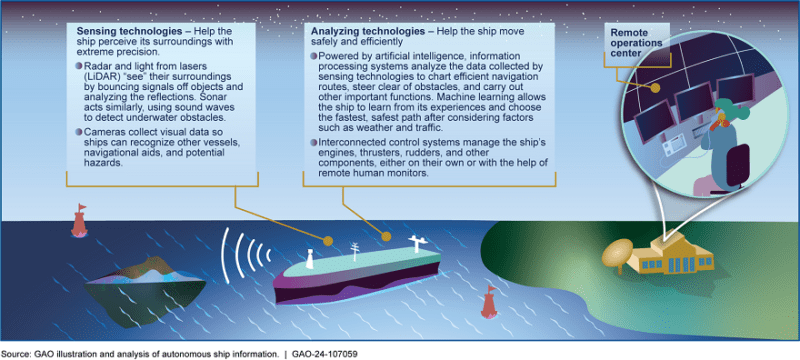US Seized Tanker Just As Warrant Was Set To Expire
By Jasper Ward WASHINGTON, Dec 12 (Reuters) – The U.S. government carried out its seizure of the M/T Skipper off the coast of Venezuela on Wednesday just as a judge-signed warrant was set to...
The U.S. Government Accountability Office (GAO) has released a new report examining the potential impact of autonomous ships on the maritime environment and the efforts of the Coast Guard to regulate them.
Autonomous ships, which use advanced technologies to control speed, direction, and navigation, promise to revolutionize the maritime industry by reducing human error and improving efficiency. However, they also pose new risks, including the threat of cyberattacks.
Currently, autonomous ships are mostly used in scenarios where a human can take control if necessary. Industry experts highlight benefits such as enhanced safety, efficiency, and workforce diversity, but also express concerns about the challenges of developing safe commercial applications. The regulatory landscape is evolving to address these issues both domestically and internationally.

The International Maritime Organization (IMO), a specialized UN agency, is crafting a regulatory framework for autonomous ships that will cover safety, training, and legal liabilities. This framework is expected to be adopted on a non-mandatory basis in 2025 and become mandatory by 2032 through amendments to existing IMO conventions. The U.S. Coast Guard, leading the U.S. delegation to the IMO, is actively involved in this process.
Different countries are taking varied approaches to regulating autonomous ships. Canada, Norway, and the United Kingdom are providing guidance on compliance with existing laws, modifying regulations, and creating new ones to address the unique challenges posed by these technologies.
In the U.S., the Coast Guard regulates autonomous ships under existing laws and regulations, which officials believe are adequate for current safety missions. However, challenges remain, including statutory limitations on reducing crew sizes, a lack of domestic examples of autonomous technology, and the need to harmonize international and domestic regulations.
The fiscal year 2023 National Defense Authorization Act mandates the GAO to report on the usage, safety impacts, and regulatory landscape of commercial autonomous ships. The report underscores the potential benefits and the regulatory hurdles that need to be addressed to fully integrate autonomous ships into the maritime industry.

Sign up for gCaptain’s newsletter and never miss an update

Subscribe to gCaptain Daily and stay informed with the latest global maritime and offshore news
Essential news coupled with the finest maritime content sourced from across the globe.
Sign Up